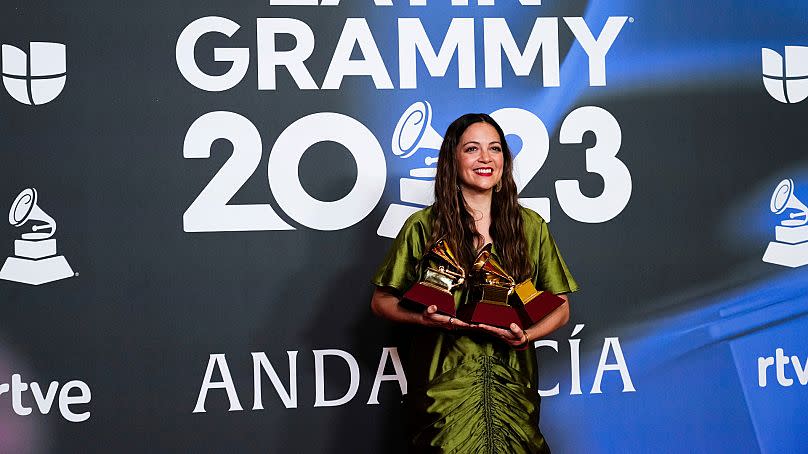Latin stars win big at first Spain-hosted Latin Grammys
- Oops!Something went wrong.Please try again later.
- Oops!Something went wrong.Please try again later.
- Oops!Something went wrong.Please try again later.
The 24th annual Latin Grammy Awards took place last night in Seville, Spain. It was the first time the ceremony was held outside of South America and boasted a star-studded show with performances from nominees Rosalía, Shakira and Laura Pausini.
Top gong went to Karol G’s ‘Mañana será bonito’, which was crowned best album of the year and best urban music album.
Shakira vs Gerard Piqué: Colombian singer sets new Latin YouTube view record with revenge song
Björk and Rosalía team up to fight industrial fish farming in Iceland with new song
Song of the year and best pop song were awarded to Argentine producer Bizarrap for his tune ‘Shakira: Bzrp Music Sessions, Vol. 53’, a collaboration with the famous Colombian singer, that made headlines as a frank diss track to her ex Gerard Piqué.
Shakira, who attended the ceremony held in Seville, Spain, accompanied by her two children, Milan and Sasha, said that she wanted to dedicate the award to them “because I have promised them that I am going to be happy.”

Natalia Lafourcade, who holds the title for most Latin Grammys in history, added more awards to her record-breaking list with record of the year. Her song ‘De Todas las Flores’ won best singer-songwriter song as well, pushing Lafourcade’s Latin Grammy award total to 17 – the most for any female artist.
Edgar Barrera, who began the night as a favourite with 13 nominations, had to settle for three awards: composer of the year (a category awarded for the first time), producer of the year and best regional Mexican song. That award came for the composition ‘un X100to’, the collaboration between his protégés, Grupo Frontera, and the superstar Bad Bunny.

Relocating the show to Seville for the first time meant that flamenco was present throughout the entire night.
It was on display from the opening, by Rosalía, who returned to her origins to offer her version of ‘Se nos muerte el amor,’ by Rocío Jurado, to the musical number by Andrea Bocelli who performed 'Granada', composed by the Mexican Agustín Lara and the performance of ‘Corazón partío’ by Alejandro Sanz, who was accompanied by 30 flamenco dancers.
But the Seville setting hasn’t been without controversy.
The relocation outside of South America is due to a three-year sponsorship deal with the Spanish Andalucían region’s government. For many South American artists though, the move represents a continuation of a preference for Spanish-language music over Latin music.

